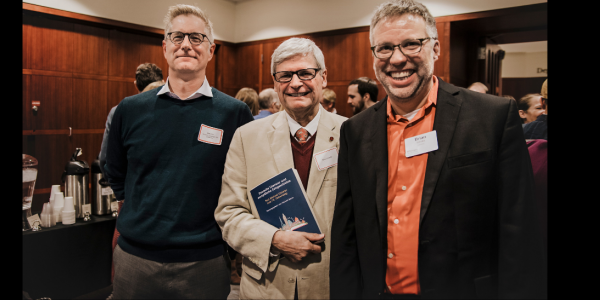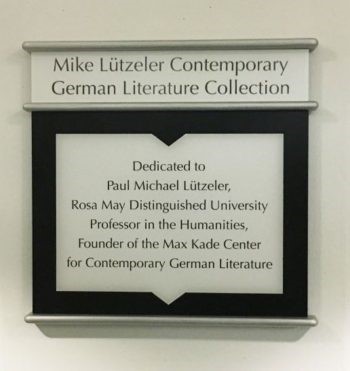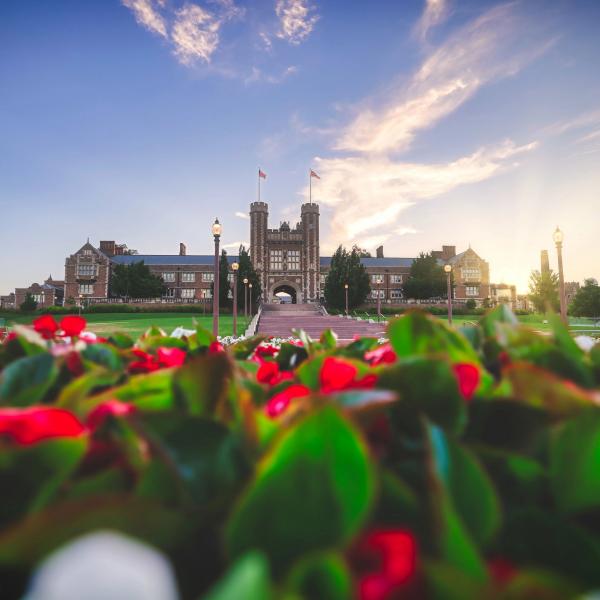On November 16, 2018, the Contemporary German Literature Collection at Washington University Libraries was renamed the Mike Lützeler Contemporary German Literature Collection in honor of Professor Lützeler.
A dedication celebration was held at Washington University’s John M. Olin Library to mark the occasion. The event featured an exhibit of titles from the collection, as well as a selection of Lützeler’s publications.
The Mike Lützeler Contemporary German Literature Collection is the largest of its kind in North America and is composed of novels, poetry, short story collections, essays, autobiographical works, and literary and cultural periodicals from Germany, Austria, Switzerland, and other German-speaking regions of Europe. The collection serves as a resource for Washington University’s Max Kade Center for Contemporary German Literature, which promotes the teaching and research of modern German literature.
“We’re privileged to have this distinctive collection right here at Washington University,” Vice Provost and University Librarian Denise Stephens said at the dedication. “We’re proud to be the home of the Mike Lützeler Contemporary German Literature Collection.”
Lützeler established the collection at Washington University in 1984, after it came to his attention that contemporary German literature was underrepresented in American university and college libraries. That same year, he also established the Max Kade Center for Contemporary German Literature, which administers a writer- and critic-in-residence program.
Lützeler is the founder and editor-in-chief of the refereed scholarly yearbook Gegenwartsliteratur (2002ff). In addition, he organizes symposia and weekend seminars on a regular basis and grants summer fellowships to faculty members and graduate students from other U.S. universities or colleges doing research in the Contemporary German Literature Collection.
In 2016, the University Libraries began overseeing acquisitions for the collection, as well as the editing and publishing of an annual bibliography, with listings for each year’s new titles. In 2017, 827 volumes were added to the collection. The bibliography is published online in Washington University’s Open Scholarship repository.
Speaking at the dedication, Matt Erlin, chair and professor of German, congratulated Lützeler on his many scholarly contributions and accomplishments and acknowledged his key role in establishing Washington University as a major center for the study of contemporary German literature.
“During his roughly 45 years in the field of German studies, Mike has done so much to shape the department and the profession – on both sides of the Atlantic,” Erlin said. “We look forward to collaborating on new strategies and programs that will maintain and enhance our commitment to the study of contemporary German literature and culture.”
A native of Doveren, Germany, Lützeler came to the United States in 1968. He earned a doctoral degree from Indiana University in 1972 and joined the Department of Germanic Languages and Literatures at Washington University in 1973. Over the years, he has published numerous books and articles, including an award-winning biography of Hermann Broch. At Washington University, he teaches in the European Studies and Comparative Literature programs, as well as in the Department of Germanic Languages and Literatures. A recipient of Fulbright and Guggenheim Fellowships, Lützeler has received many awards for his research and teaching.
Brian Vetruba, Germanic Languages and Literatures, Comparative Literature, and European Studies librarian at Washington University Libraries, has worked with Lützeler on the Contemporary German Literature Collection for the past 17 years.
“Mike is a great colleague and mentor,” Vetruba said. “The Washington University Libraries, the German department, and German literature scholars worldwide have benefited from his scholarship and from this collection.”
The Mike Lützeler Contemporary German Literature Collection is housed on Level B of John M. Olin Library. All items in the collection can be found via the University Libraries’ Classic Catalog and Primo. Collection materials can be made available to other universities via interlibrary loan.






